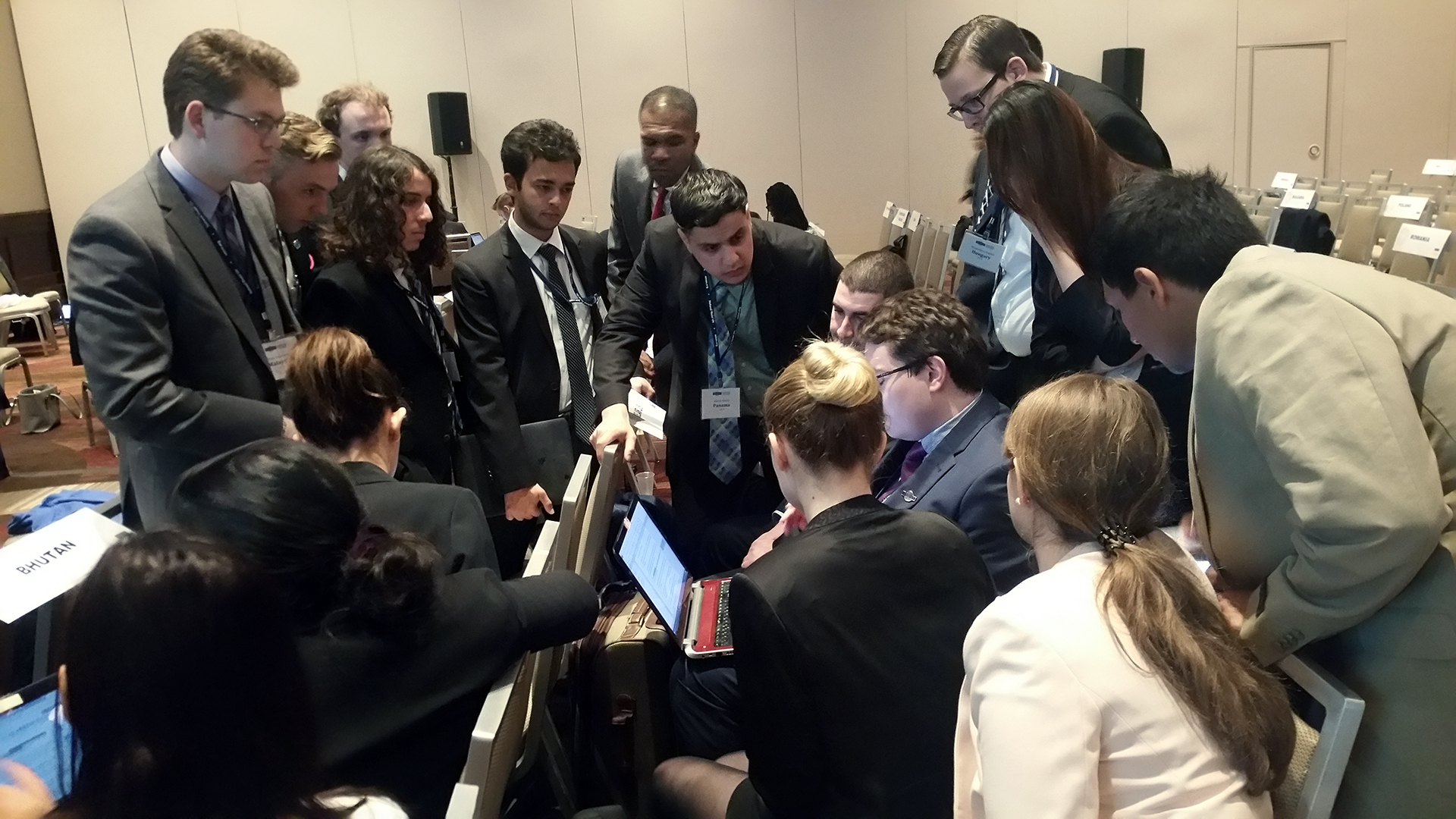Monday, May 1, 2017
Team has won top award eight of last nine competitions
by Robert Leitner ’17
In April, Rider’s 2017 Model United Nation (UN) team won the Outstanding Delegation Award, four position paper awards and two peer awards, making it the most successful Model UN team in Rider history.
Rider’s team won Outstanding Position Paper awards in the General Assembly Third Committee, the High Level Political Forum on Sustainable Development, the World Food Program and the International Atomic Energy Agency. The peer awards went to Drew Gandham and Ruth Del Pino on UNICEF and Jelani Walker and Georgiy Ginak on the Security Council.
These awards were won at the national Model UN competition held in New York City, which attracts 6,500 students, a majority of whom are international and from non-U.S. institutions.
“Without the help of a number of Rider alumni and the exceptional team leaders, Aasim Johnson, Kenny Dillon and Jelani Walker, the team would not have brought home Outstanding Delegation Award and peer awards,” says Dr. Barbara Franz, the faculty advisor of Rider’s Model UN team.
Rider’s Model UN team has won the top award of Outstanding Delegation eight times out of the last nine competitions.
The Model UN program encourages students of all majors to interview and try out for a spot on the team. Being that the team tackles a range of issues that the United Nations is currently facing, a diverse group of students plays to their advantage.
Rider’s success in the Model UN competition is well-deserved. Aasim Johnson, a senior history major and head delegate of Rider’s Model UN team, says the most challenging part is the preparation for the event. After selecting the team members and once a country is assigned the team leaders help prepare students with the skills necessary to compete as Model UN delegates at the national competition.
Kenny Dillon, a double major in political science and philosophy and team leader for Rider’s Model UN team, agreed that preparing for the conference can be challenging.
“Before the competition, the biggest challenges are definitely time management, the codification of our country’s position and the formulation of novel solutions to complex problems that align with the official position,” says Dillon.
Nerves were racing as the competition approached. This year marked half a century of Model UN competitions for Rider, and the team was made up of a majority of students who had never participated in the competition.
“There were high expectations for the performance of this team and every delegate felt this deeply, which created a strong social fabric among them,” says Franz. “The new students brought a lot of energy and excitement to the team that was much appreciated by the returners.”
To help prepare for this year’s competition, Franz and the team leaders organized a mock conference on Rider’s Lawrenceville campus and invited all universities in the vicinity that were signed up for the national competition. With the help of Rider's Model UN alumni, the event was successful, and it helped ease the nerves of performing in the actual competition.
“The point of the mock conference was to give our delegates and other competing students a chance to practice procedures and work on working papers,” says Johnson. “From the schools that came, Rider’s students did the best and I think that took the edge off of the actual conference.”
Prior to the competition students are engaged in area studies, comparative politics, international relations and several other academic fields as well as various methods of research in order to act in “character” of their chosen country’s delegates.
Franz expects a lot from the team and they deliver every year, along with taking much of what they learned with them to their careers.
“Some students come to Rider because of this program, however, there is no other program at the University that consistently has alumni going to the Ivy League and top law schools, the State Department, other government jobs, and prominent international government organizations and non-governmental organizations,” says Franz.
Rider’s Model UN program continues to build upon its reputable record it has amounted. Being a part of the esteemed program gives students a chance to take on responsibilities that they otherwise wouldn’t experience.
For Johnson, Model UN has introduced him to the teaching environment and how to productively work with people who adamantly disagree with each other.
“I found leading and teaching the class to be the most helpful part for me because it was difficult to work with all the different personalities during the year,” he says.
For Dillon, Model UN has provided him with leadership opportunities and with the confidence to speak publicly and defend an unpopular opinion for the sake of his position as well as the ability to calmly yet firmly navigate tense conflicts.
“I had a huge opportunity for personal growth this year,” says Dillon. “I went into my committee alone and was able to win a position paper award for my individual work. I was new to the leadership role this year, and I had the opportunity to guide some newcomers in the right direction. I wouldn't give this experience up for anything.”
Support the Model UN 50 for 50 campaign. $50,000 is being raised to endow a fund to permanently support this award-winning program for future generations of Rider students. If the Model UN program changed your life or enriched the life of a loved one, please consider a gift (be sure to write in "Model UN").
For more information, contact Caroline Cleaves in University Advancement at [email protected].

